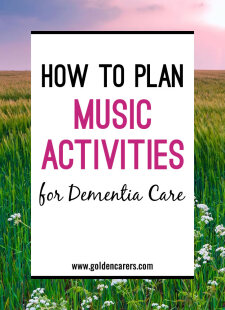Shared By
Molly
 Activity Professional & Writer
Activity Professional & Writer
The Seven Stages of Alzheimer's Disease

Alzheimer’s is a progressive disease that affects individuals in different ways throughout seven stages.
Understanding the disease progression helps us recognize changes in behavior and provide the right support. Symptoms will gradually worsen over time, however there are ways we can make life better at every stage.
Stage One
Rarely is a person diagnosed with Alzheimer’s during the first stage of the disease progression. There are few signs or symptoms during this stage, and any memory impairment can easily be explained away by stress or simple human error.
Stage Two
Signs and symptoms are a bit more noticeable during the second stage of Alzheimer’s. It is more common to forget certain words or more easily lose train of thought during this stage. People may experience symptoms like losing personal items or minor memory impairment.
Again many of the symptoms, while noticeable, are still too minor and can be explained away. Someone in Stage Two can also still pass memory tests given by physicians to detect Alzheimer's so a doctor may not even realize it during this stage.
Stage Three
Often it isn’t until stage three of the disease progression before Alzheimer's disease is detected or even suspected by close friends and family of the individual. During phase three prominent signs of mild memory impairment would be:
- The loss of vocabulary or word choice/placement
- Short term memory recall
- Misplacing or losing everyday items, i.e., keys, wallet, or phone
A physician's memory test can detect mild Memory Impairment during this stage. It is important to note that while a close family may notice the changes in their loved one's behavior, it is common for spouses or family members to make up excuses for their loved one during this stage, which often defers diagnosis until stage four.
Stage Four
Stage Four of Alzheimer’s will cause moderate Memory Impairment for the individual. In addition to memory impairments, the individual will struggle to keep up with their finances and bill paying. Short term memory loss is more significant, and the person may forget what they did the day before or even that morning.
The person’s spouse or family member will start to become their caregiver during phase four. They may need to take on meal prep, billing, and household chores. By stage four a diagnosis has most likely been made by the physician and a treatment plan is in place.
Stage Five
Stage Five Alzheimer’s severely affects a person’s ability to care for themselves. Assistance in activities of daily living is required, for example, help getting dressed, eating, or bathing may all be needed. More severe mood changes will take place during stage five and can cause episodes of extreme anger, depression, or confusion.
Severe Memory impairment may affect a person’s ability to recognize close friends or family members, and their memories may regress to their younger years as they believe that their adult children are once again in grade school or that their parents are still alive.
Stage Five through Seven will more than likely require skilled care by either a family caregiver or a professional caregiver.
Stage Six
Stage Six manifests in a severe decline for an individual living with Alzheimer's Disease, and they will require assistance in multiple aspects of their day-to-day life. Incontinence or bladder control will be impacted, activities of daily living may need full support, and confusion and mood swings are often severe.
It is not uncommon for a person in stage six to lose personal history and may even forget their name. Care during this stage should be focused on the present and the person should not be quizzed on their personal history.
Stage Seven
The seventh stage or end-stage of Alzheimer’s disease will require full around-the-clock care for the individual. Loss of motor skills and speech affect the person’s ability to move their bodies independently or speak.
Providing comfort care during this stage is so important. Gentle touch or hand massages, playing soft music, and dimming the lights are all comforting tactile interventions the caregiver can provide during this stage.
The Alzheimer's Association cites that a person can live up to twenty years after a diagnosis but more commonly the life expectancy of the disease is four to eight years after diagnosis.






Thank you so much for your article. I’m dealing with my husband who is most likely between 3 and 4 right now. He is just now starting to talk about it - so sad to watch a loved one going through this horrible disease.
Thanks again.
Hi Andrea
You are correct and is very sad
But I’d try to focus on the positive on things they can still do and perhaps you can modify some activities that they used to like that you can make simpler
Try to do what you can
Thank you. Very helpful.
What a wonderful article! My Alzheimer residents are my passion. Thank you for sharing
Thanks so much for your feedback Mary x
Very useful article, thank you.
useful article.
Thank you Molly, a most helpful article
Wonderful article. Very helpful Thank you!
Thank you for your feedback Lisa!
A new article has been submitted: The Seven Stages Of Alzheimer's Disease